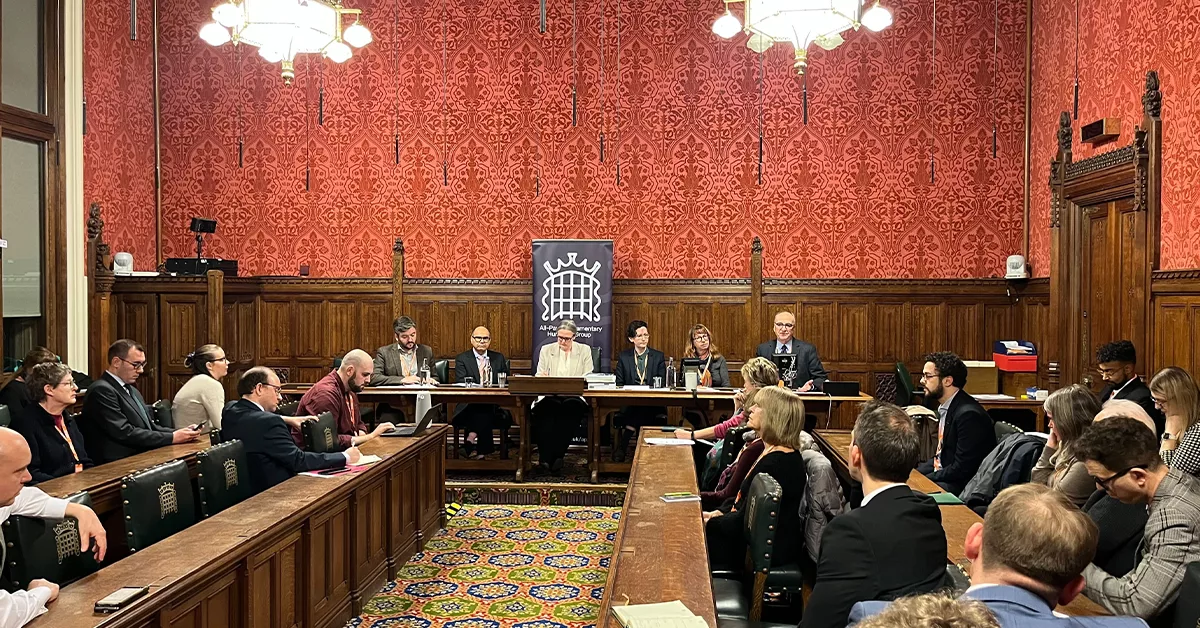
The All-Party Parliamentary Humanist Group (APPHG) met on Wednesday evening to discuss the National Curriculum Review and the Government’s Children’s Wellbeing and Schools Bill. Parliamentarians and others at the meeting welcomed the direction of the Review and many of the provisions in the Bill but also discussed how the Bill might be taken further to ensure better safeguarding for children and to prevent unintended consequences.
Attending parliamentarians heard from Dr Kathryn Wright, CEO of Culham St Gabriel’s; Prof Ted Cantle, Founder, iCoCo (Institute of Community Cohesion) Foundation; Yehudis Fletcher, Author and Founder, Nahamu; Victor Shafiee, Deputy Director, Ofsted; and Andrew Copson, Chief Executive of Humanists UK. The meeting was chaired by Lizzi Collinge MP, who was also elected new Chair of the APPHG.
Dr Kathyrn Wright discussed the inequity of religious education between schools and how the lack of its place within the national curriculum causes this difference in quality. She discussed Culham St Gabriel’s’ submission to the Curriculum and Assessment Review where it calls for this to change to ensure a minimum standard of provision. She would also see the subject changed to be fully inclusive of humanism. The expectations of pupils should be the same regardless of the school they attended.
Professor Ted Cantle discussed the detrimental effect that faith schools have on community integration and cohesion due to their admissions policies. He raised the fact that there is clear evidence that faith schools are driving residential segregation as local places are denied to parents who are of the ‘wrong’ faith or of no faith. He also debunked the common claim that faith schools are better academically than other schools: their better results are down to their selection policies which result in them selecting children from richer families and fewer children with special educational needs.
Yehudis Fletcher gave her personal experience of the Charedi Jewish community. Nearly every boy in the community will attend an unregistered school setting after their Bar Mitzvah. Prior to that even their secular education will often be limited to two hours a day at most. Later on in life this lack of education means that many are functionally illiterate and have limited access to the job market. They are often restricted to working within the community perpetuating the issues of social control. She welcomed the Children’s Wellbeing and Schools Bill as a good step to helping keep children in the Charedi community safe but called for local authorities to receive targeted funding to address these issues.
Victor Shafiee discussed Oftsed’s role in investigating unregistered schools and had some of the harrowing accounts. Currently Ofsted frequently lacks sufficient powers to effectively investigate illegal schools, sometimes being refused entry to premises, and legally prevented from taking evidence away with them. Victor told of cases where children had been found shivering in cold schools with a significant lack of safeguarding, and one case where to get water children had to go outside the school entirely.
Andrew Copson welcomed much of the Bill, especially its provisions to shut illegal schools and the reforms to the curriculum. However, one key issue he did raise was that this bill is set to unintentionally allow 100% religiously selective schools to open for the first time since 2011. He also raised that the Bill would be an excellent opportunity to raise the issue of collective worship. At present, there is a legal requirement for all state-funded schools to hold a daily act of collective worship (Christian in the case of schools of no religious character). Although there is a parental right to withdraw a child from collective worship, there is no requirement for the school to provide an alternative and pupils are often left in empty classrooms away from their classmates.
Humanists UK Director of Public Affairs and Policy Richy Thompson said:
‘This vital bill is a great step to bringing the scourge of illegal schools to an end and making sure all children can access a good education. We also hope that the Curriculum Review will allow for RE to finally be put into the national curriculum as an inclusive, impartial subject. And we hope that the Government will listen to our concerns about making sure that new 100% religiously selective schools are unable to open.’
Notes
For further comment or information, media should contact Humanists UK Director of Public Affairs and Policy Richy Thompson at press@humanists.uk or phone 0203 675 0959.
Read more about our work on schools and education.
Humanists UK is the national charity working on behalf of non-religious people. Powered by over 120,000 members and supporters, we advance free thinking and promote humanism to create a tolerant society where rational thinking and kindness prevail. We provide ceremonies, pastoral care, education, and support services benefitting over a million people every year and our campaigns advance humanist thinking on ethical issues, human rights, and equal treatment for all.
